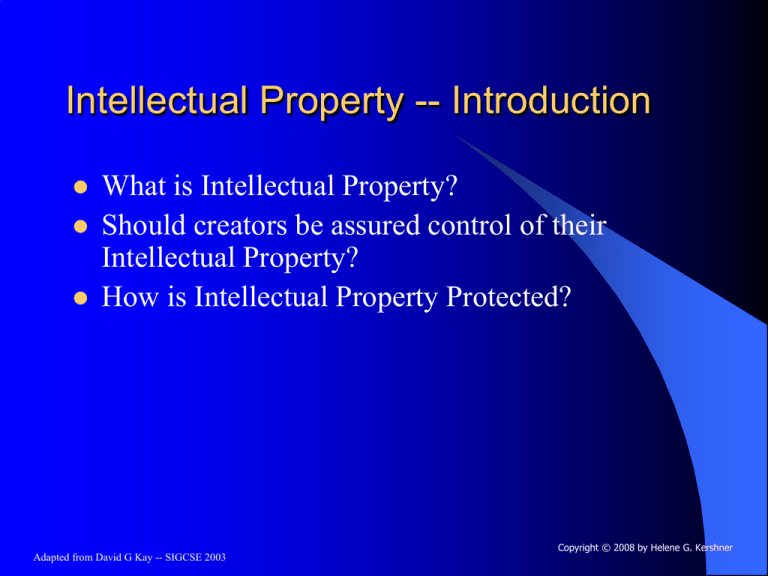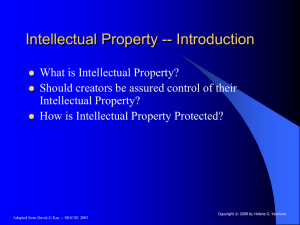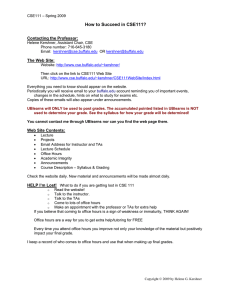
Intellectual Property -- Introduction
What is Intellectual Property?
Should creators be assured control of their
Intellectual Property?
How is Intellectual Property Protected?
Copyright © 2008 by Helene G. Kershner
Adapted from David G Kay -- SIGCSE 2003
Intellectual Property
How would you define Intellectual Property?
Copyright © 2008 by Helene G. Kershner
Intellectual Property
– An intangible asset, considered to have value
in a market, based on unique or original
human knowledge and intellect.
– Intellectual property may or may not be
associated with a patent or copyright or other
form of protection.
www.bridgefieldgroup.com/glos4.htm
Copyright © 2008 by Helene G. Kershner
Adapted from David G Kay -- SIGCSE 2003
Intellectual Property
According to the World Intellectual Property
Organization:
– Intellectual property refers to creations of the mind:
inventions, literary and artistic works, and symbols,
names, images, and designs used in commerce.
Unfortunately, there is no world standard for
protecting intellectual property.
Copyright © 2008 by Helene G. Kershner
Categories of Intellectual Property in
the United States
U.S. Constitution: The Congress shall have power
“to promote the progress of science and the useful
arts, by securing for limited times to authors and
inventors the exclusive right to their respective
writings and discoveries.” (Art.1, sec.8 cl.8)
Patent (Federal Law)
Copyright (Federal Law)
Trademark (Mostly Federal)
Trade Secret (Mostly State Law)
Copyright © 2008 by Helene G. Kershner
Adapted from David G Kay -- SIGCSE 2003
US Patent Requirements
Statutory Criteria
Any new and useful process, machine [article of]
manufacture, or composition of matter
Not phenomena of nature, scientific principles,
abstract ideas, or pure mathematical formulas
Novelty – does not exist in the “prior art”
What about software?
Non-obviousness
– At the time the invention was made
– To a person “having ordinary skill in the art”
Copyright © 2008 by Helene G. Kershner
Adapted from David G Kay -- SIGCSE 2003
US Copyright Requirements
Automatic once work is tangible
Copyright notice helpful, but NOT required!
Copyright © 2001 by Peter Programmer. All rights reserved
Registration optional: It is easy, inexpensive and
extremely useful.
Why would registration be useful, important, or
even necessary?
Copyright © 2008 by Helene G. Kershner
Adapted from David G Kay -- SIGCSE 2003
US Copyright Requirements
Author exclusively may
–
–
–
–
Reproduce
Distribute
Create derivative works
Perform or display publicly
Infringement is unauthorized use with
Substantial similarity
Access to copyrighted work
Adapted from David G Kay -- SIGCSE 2003
Copyright © 2008 by Helene G. Kershner
US Copyright Does Not Protect …
Independent Creation
Underlying ideas
Portions in the public domain
Aspects dictated by external constraints
(e.g. Standards, compatibility, efficiency, common
practice)
“Fair Use”
Use outside the United States
– expect where protected by other treaties and
agreements.
Copyright © 2008 by Helene G. Kershner
Adapted from David G Kay -- SIGCSE 2003
Cyberethics
Ethics and the Computer
“New technology creates challenges in the areas of privacy,
property, security and individual identity and radically
reshapes life styles around the globe.” http://cyberethics.cbi.msstate.edu/
– This is an interdisciplinary problem. It is not limited to Computer
Science, or Engineering, or Business or even Philosophy.
– This is a problem for every one, every day.
Like it or not -- We are an Information Society.
– More people employed in “collecting, handling and distributing
information than any other occupation.”
http://www.misq.org/archivist/vol/no10/issue1/vol10no1mason.html
– Millions of computers and computer-like devices on the planet
– More information is posted daily on the Web than any one, or any
organization or government
Can access
Can process
Can read and understand
Copyright © 2008 by Helene G. Kershner
Cyberethics – Intellectual Capital
What kind of society are we becoming?
“Information is the means through which the mind expands
and increases its capacity to achieve its goals.”
“Intellectual Capital” is how people build their lives, careers,
sense of self.
But, “intellectual capital” is more at risk than physical capital
(money) or things we create.
“Intellectual capital” is damaged or lost whenever we “lose”
information about ourselves, especially when we are not paid
in someway for this loss.
“Intellectual capital” is subject to error and misuse.
– It can be stolen and used against our will.
– We can be lied about, Ex. JuicyCampus.com
– We can be threatened
http://www.misq.org/archivist/vol/no10/issue1/vol10no1mason.html
Copyright © 2008 by Helene G. Kershner
Cyberethics
Four Ethical Questions to think about for the Information
Society:
1.
2.
3.
4.
Privacy – What information are we obligated to reveal to
others about ourselves or our associations, and under what
conditions and with what safeguards?
Accuracy – Who is responsible for making sure the
information “out there” about us is accurate and authentic?
And, if it’s not, how does it get fixed?
Property – “Who owns information? What are the just and fair
price’s for its exchange?”
–
Who owns the ways information is transmitted?
Accessibility – What information do individuals, organizations,
companies, and the government have the right “or privilege to
obtain, under what conditions and with what safeguards?”
http://www.misq.org/archivist/vol/no10/issue1/vol10no1mason.html
Copyright © 2008 by Helene G. Kershner
Cyberethics
Privacy: Forces that threaten our privacy are:
– Incredible capacity to gather information without out obvious
control (Internet)
– Results of 9/11, increased surveillance
Who is watching the watchers? No One.
Accuracy: Misinformation can make a mess of our lives.
– What if this misinformation is held and used by people with power
over our lives: IRAQ
– Credit bureaus, bank errors,
– Real information that has been edited
– Identity theft
Copyright © 2008 by Helene G. Kershner
Cyberethics
Property – How do we really protect intellectual property?
– There is the Law
– But, there are people who ignore the law
Terribly easy to steal intellectual property
Should ease of theft determine our ethics?
Access – One way to protect information is to improve
access to the information stored about us.
– Through education we gain access to information
– Universal access to technology?
One laptop per child – is this enough
Wireless computers, telephones, etc.
Access to the Internet
Through Access it may be possible for each of us to
look out for ourselves and each other.
http://www.misq.org/archivist/vol/no10/issue1/vol10no1mason.html
Copyright © 2008 by Helene G. Kershner







